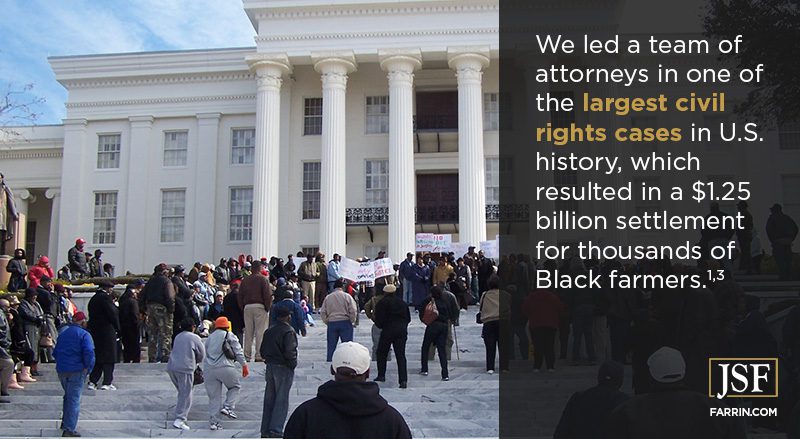Hurt by police misconduct in North or South Carolina? We can help.
Police misconduct should be punished. Seek justice and compensation for everything you may have suffered.
Police Misconduct Lawyers Serving North and South Carolina
Police officers are entrusted with great authority to enforce the law, but some misuse their power to commit unlawful acts against people. If police misconduct happens to you, it is a violation of your civil rights.
Police misconduct can be highly traumatic. If you believe an officer abused their authority with you, call us for a free case evaluation. We can give you clarity on your case with no obligation.
Our police misconduct attorneys are on your side. We know how to help you fight back and pursue full compensation for any harms and losses you’ve suffered. Contact us online or call 1-866-900-7078 today.
What Are Some Examples of Police Misconduct or Abuse of Authority?
Police misconduct can take many forms. Some of the most common are:
- Wrongful arrest – arresting someone without a lawful reason
- Wrongful “no knock” execution of a search warrant
- Falsifying evidence – planting evidence to frame someone for a crime they didn’t commit
- Excessive force/police brutality including police shootings
Other common forms of police misconduct include:
- Unlawful search and seizure – improperly confiscating a citizen’s property
- Sexual harassment – sexually inappropriate remarks or behaviors
- Racial profiling – illegally detaining or otherwise harassing someone because of their race
- Harassment and intimidation – threatening to arrest someone without reason
- Retaliation – harassing, detaining, or arresting someone for complaining about the police
- Neglecting duty – refusing or failing to investigate a crime despite the presence of evidence
- Violations of Miranda rights – not disclosing or violating the rights of those who’ve been arrested
The Severe Impact of Police Misconduct
Victims of police misconduct can suffer lifelong negative effects. According to the National Institutes of Health, the consequences of being wrongfully arrested can include:
- Loss of identity
- Stigma
- Deterioration of physical and mental health
- Damaged relationships
- Negative attitudes towards the criminal justice system
- Financial difficulties
- Trauma
- Adjustment difficulties
You can and should fight back if you’ve suffered any of the following harms due to police misconduct:
- Physical pain and suffering
- Emotional and psychological trauma
- Loss of income
- Damaged or destroyed property
- Embarrassment, humiliation, or damaged reputation
In Orangeburg, South Carolina, a Black man received a $650,000 settlement and a written apology after a police officer stomped on the back of his head, causing him severe physical pain and suffering as well as ongoing psychological trauma. The officer was fired and charged with assault.
Need a civil rights lawyer? Contact us at 1-866-900-7078 today for a free professional opinion on your police misconduct case.
Monell Claims and Holding Municipalities Accountable for Police Misconduct
A Monell claim can be a way to hold local government accountable for one of their employees violating your civil rights, if that violation occurs due to the organization’s policies, procedures, or culture.
In the landmark case Monell v. Department of Social Services of the City of New York, the Court held that people can bring Section 1983 claims against municipalities or other local government units, including police departments.
To hold a government entity responsible, an employee’s constitutional violation must have been in accordance with an official municipal “policy or custom,” according to the U.S. Supreme Court in Monell, which is a very strict standard. In a later case, Heck v. Humphrey, the Supreme Court held that a lawsuit can be filed against police officers to seek accountability for an unlawful or illegal arrest resulting in conviction of a crime to a person.
How Do You Establish Municipal Liability for Police Misconduct?
If you’ve been subjected to police misconduct, there are three things you need to establish to make a successful Monell claim:
- Your civil rights were violated
- The violation occurred due to the department’s policies, procedures, or culture
- The policy or practice directly caused your civil rights to be violated
In Raleigh, North Carolina, a sheriff’s office agreed to a $6 million settlement following a Monell claim filed against it over a pattern of excessive force and racism by its deputies. An investigation found that the behavior was known about and accepted by the sheriff’s office’s leadership.
What Is an Example of a Violation of Miranda Rights?
Miranda rights are the rights of people who have been arrested and are being interrogated by police. They include:
- The right to remain silent
- The right to an attorney. If you can’t afford one, then an attorney will be appointed for you
- The right to know that anything you say can be used against you
- The right to stop answering questions at any time
Police misconduct can occur through violations of your Miranda rights, such as:
- Intimidating or coercing you to answer questions against your will
- Denying you access to an attorney after you’ve requested one
- Withholding information about your Miranda rights or not making you fully aware of them
- Misrepresenting your Miranda rights to deliberately mislead or confuse you
What Is Wrongful Arrest?
Wrongful arrest is when a police officer purposefully arrests you for what they know is an unlawful reason. It is often related to other instances of police misconduct such as unlawful searches and seizures, racial profiling, and harassment and intimidation.
Wrongful Arrest Compared to False Arrest
“Wrongful arrest” and “false arrest” are terms that are sometimes used interchangeably, but they’re not the same thing. The difference is in the intention of the arresting officer.
If a police officer arrests the wrong person but is not acting in bad faith or with unlawful intention, then it is a false arrest. For example, if an officer arrests the wrong person due to mistaken identity, then it is a false arrest.
But, if an officer knowingly and purposefully arrests a person they know has not committed a crime or if they have no reason to suspect the person has committed a crime, it is likely a wrongful arrest and a violation of your civil rights.
In Fayetteville, North Carolina, a woman filed a complaint after being wrongfully arrested in a drive-by shooting case without a warrant or probable cause. She received a settlement from the police department for $60,000 and a written apology from the Fayetteville police chief.
How Our Police Misconduct Attorneys Can Help You if Your Rights Were Violated
Our police misconduct attorneys can assist you in your pursuit of justice by:
- Giving objective advice
- Researching and analyzing claims
- Investigating law enforcement recordings, reports, policies, and practices
- Filing a complaint on your behalf in state or federal court
- Gathering evidence through the Discovery process
- Reviewing autopsy and/or medical examiner reports if needed
- Negotiating possible resolutions and pursuing maximum compensation
- Representing clients in court when needed
The types of damages you may be entitled to include:
- Compensatory damages for the harms you suffered
- Punitive damages to deter future harmful actions by police
- Police misconduct attorney fees
- An injunction or official order preventing police from engaging in similar misconduct
The Law Offices of James Scott Farrin Has the Experience and Resources to Help You
Our attorneys are passionate about helping you fight for your civil rights. It’s who we are as a firm.
Since we opened our doors, we’ve helped more than 78,000 people recover more than $2 billion in total compensation.1 We also led a team of attorneys in one of the largest civil rights cases in U.S. history, winning a $1.25 billion settlement on behalf of Black farmers for discrimination by the United States Department of Agriculture.1,3
We work on a contingency fee basis, meaning you pay nothing up front to hire us – and no attorney’s fee at all if we don’t recover compensation for you. Guaranteed.2
If you think you’ve suffered police misconduct, contact us today for a free case evaluation – reach us online or by calling 1-866-900-7078.




